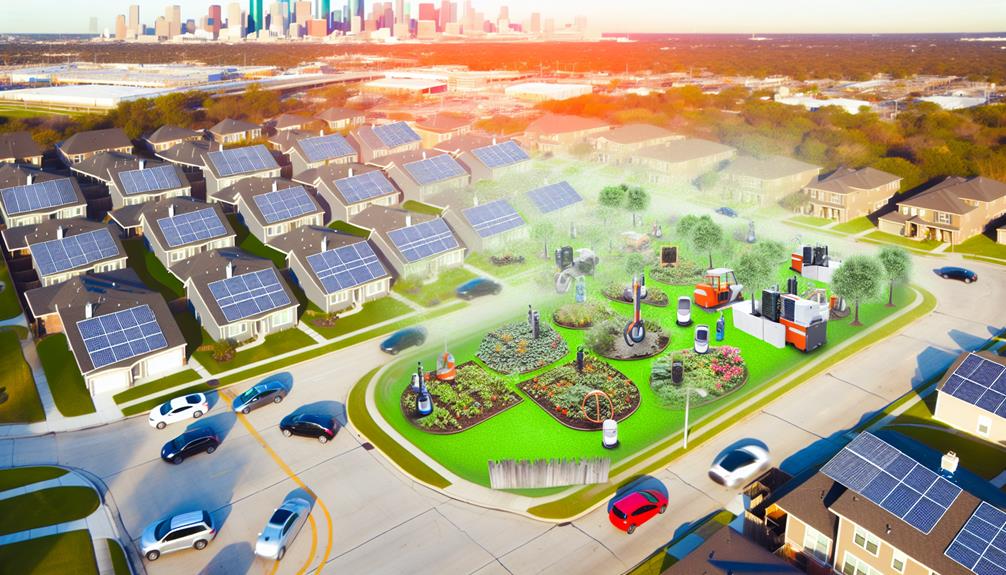Making sure the air in Houston stays clean and healthy is vital for the well-being of all residents. By enforcing strict rules on emissions and backing cleaner energy options, we can significantly cut down on harmful pollutants.
Yet, the real challenge isn't just finding these solutions but also putting them into action across different areas. It's crucial to come up with fresh ideas and work together to deal with the complexities of keeping the air quality in check in a busy city like Houston.
Key Takeaways
Let's crack down hard on those who pollute our air illegally. It's time to team up with government agencies to make sure everyone sticks to the rules on air quality. We need to spread the word about the serious health dangers linked to poor air quality. Encouraging eco-friendly habits like using public transport and electric cars is key. By setting tougher rules and penalties for harmful emissions, we can create a healthier place to live.
Impact of Air Pollution on Health
Asthma is a big concern for folks in Houston, affecting one out of every ten adults. The city's air pollution, mainly from about 500 risky factories nearby, has a major impact on people's health. Shockingly, in Texas, a whopping 97% of illegal emissions go unpunished, which is a serious problem. The Environmental Protection Agency (EPA) keeps a close eye on Houston's air quality to tackle the health issues caused by pollution.
Breathing in polluted air can set off asthma attacks and worsen respiratory problems. Houston deals with harmful fine particles and ozone in the air that can lead to breathing troubles and up the chances of heart issues. This is especially worrying for at-risk groups like kids, seniors, and those with existing respiratory conditions.
To fight the health effects of air pollution in Houston, there's a push for stricter penalties on illegal emissions. Partnerships with government bodies are working to tighten up rules and enforcement to cut down on harmful emissions. By cracking down on illegal releases and enforcing air quality standards, Houston aims to give its residents cleaner air and reduce the health risks linked to pollution.
Sources of Air Pollution in Houston
Houston is no stranger to air pollution, with around 500 hazardous facilities contributing significantly to the city's air quality woes. These sites pump out a mix of harmful pollutants, affecting the overall air quality in Houston.
Key culprits behind the pollution include:
- Factories Galore: Houston's industrial plants are major players in the pollution game, spewing out sulfur dioxide, nitrogen oxides, and volatile organic compounds. These emissions not only create smog but also take a toll on our respiratory health.
- Traffic Troubles: The sheer number of vehicles on Houston's roads means traffic emissions are a big issue. The burning of fossil fuels in cars and trucks releases carbon monoxide and particulate matter, adding to the city's air quality problems.
- Oil and Gas Hassles: Houston's oil and gas operations are prime offenders, releasing methane and volatile organic compounds into the air. The close proximity of these facilities to residential areas makes the air pollution even more impactful on the respiratory health of Houstonians.
These sources of air pollution in Houston underscore the urgent need for strict regulations and enforcement to curb illegal emissions and enhance the air quality for the community's well-being.
Effects of Poor Air Quality

Breathing in the polluted air in Houston can seriously harm your respiratory health and overall well-being, impacting a large number of people. The poor air quality, filled with harmful pollutants, poses a significant threat to both your health and the environment. In Houston, around 1 in 10 adults struggle with respiratory issues like asthma due to the negative effects of air pollution. This concerning data highlights the pressing need to tackle the environmental factors contributing to the city's poor air quality.
Air pollution isn't just a minor inconvenience; it can trigger allergies, worsen heart conditions, and cause lasting harm to your lungs. Exposure to dangerous air pollutants such as ozone and particulate matter significantly increases the risk of respiratory infections, posing a serious threat to public health. Particularly vulnerable groups like children, the elderly, and individuals with existing health conditions are at a higher risk of facing the negative impacts of poor air quality.
Furthermore, the consequences of breathing polluted air extend beyond temporary discomfort. Prolonged exposure to contaminated air can lead to the development of severe health issues, including heart diseases and even lung cancer. It's crucial to prioritize efforts that focus on enhancing air quality standards in Houston to protect the well-being of its residents and prevent further pollution of the environment.
Importance of Emissions Standards
Implementing and adhering to strict emissions standards is crucial for protecting the health of Houston residents by reducing the release of harmful pollutants into the air. These standards are vital for ensuring clean and breathable air in the city. Let's dive into why following emissions standards is so important:
- Cutting Down on Nitrogen Oxides: By enforcing emissions standards, we can effectively limit the amount of nitrogen oxides entering the atmosphere. Nitrogen oxides are significant contributors to smog and acid rain, so controlling their release leads to a noticeable improvement in overall air quality.
- Reducing Volatile Organic Compounds: Tighter emissions standards also help decrease the emission of volatile organic compounds (VOCs) from vehicles and industrial processes. VOCs can combine with other pollutants in the air to create ground-level ozone, a key component of smog. Compliance with these standards results in lower levels of VOCs in the air, making it safer for everyone to breathe.
- Ensuring Accountability: Monitoring emissions and enforcing standards are essential for pinpointing sources of pollution and holding those who violate regulations accountable. This proactive approach guarantees that Houston residents can breathe clean air free from harmful pollutants, reducing the risk of respiratory issues and other health concerns.
Benefits of Public Transportation

Taking public transportation can really help ease traffic jams, saving us all tons of time and gas every year. Plus, by using buses or trains, we can cut down on our carbon footprint by thousands of pounds annually.
Not only does hopping on public transit save us cash on gas and parking fees, but it also means cleaner air for our communities thanks to less pollution from traffic.
Reduced Traffic Congestion
Taking public transportation in Houston can really make a difference in easing up traffic and making the air cleaner for us all. When we choose buses, trains, or other public transit options, we're actively cutting down on the harmful stuff cars spew into the air.
Efficient public transportation systems are key in offering sustainable travel choices and ultimately leading to better air quality. Houston needs to invest in its public transportation infrastructure to fight air pollution caused by traffic, creating a healthier environment for everyone.
Lower Carbon Emissions
Using public transportation in Houston has a huge impact on cutting down carbon emissions, making our city cleaner and healthier for everyone. Houston's public transit system helps prevent about 22 million metric tons of CO2 emissions each year.
When people opt for public transportation, they can save up to $10,160 annually on transportation costs and reduce their carbon footprint by 4,800 pounds per year. This decrease in carbon emissions not only boosts air quality but also plays a crucial role in fighting climate change.
According to the Texas A&M Transportation Institute, investing in public transportation could result in a reduction of 37 million metric tons of greenhouse gas emissions by 2050. Embracing public transit in Houston is a significant step toward building a more sustainable and eco-friendly city for everyone.
Improved Air Quality
When you hop on public transit in Houston, you're doing your part to clean up the air we all breathe. Public transportation in our city is a key player in cutting down on harmful emissions and greenhouse gases that mess with our air quality. Opting for the bus or train instead of driving solo means fewer cars on the road, which equals less pollution in the air we share.
Houston's METRO system not only eases traffic jams but also helps keep our air fresher. Plus, taking public transit slashes greenhouse gas emissions, making our environment healthier. Embracing public transportation isn't just good for you as a commuter – it's a win for our city's air quality and a step towards a more sustainable urban environment.
Role of Green Spaces in Air Quality

Urban green spaces are like nature's air purifiers in the city. Trees and plants in these green areas help soak up nasty stuff like carbon dioxide, nitrogen oxides, and yucky particles, making the air cleaner and fresher.
Plus, these green havens can cool down the city heat, making the air healthier for everyone living there. It's like having a little piece of nature right in the midst of the urban jungle, cleaning up the air we breathe and keeping us feeling good.
Green Spaces Benefits
In bustling cities like Houston, having green spaces is a game-changer for air quality. Trees and plants in these areas work wonders by soaking up pollutants and pumping out oxygen through photosynthesis. They act like natural air filters, sifting out harmful particles to keep the air cleaner for everyone.
Not only do parks and green zones purify the air, but they also help cool things down, combatting the stifling urban heat and cutting back on ground-level ozone, which is a win for air quality. Being able to enjoy these green spaces isn't just good for your physical and mental well-being; it's a breath of fresh air in more ways than one, helping to combat pollution in our cities.
Urban Air Quality
Improving air quality in cities by incorporating green spaces strategically is crucial for reducing pollution and promoting better respiratory health among urban dwellers. Urban green areas play a key role in soaking up air pollutants, sifting out harmful particles, and lessening the impact of the urban heat island effect, resulting in lower levels of pollutants like ground-level ozone. The trees and plants in these green spaces aid in natural air purification processes, ultimately contributing to overall better air quality in city settings. Access to well-designed green infrastructure in urban areas not only enhances the visual appeal but also combats air pollution, leading to improved respiratory health for residents.
| Benefits of Green Spaces | |
|---|---|
| Absorb air pollutants | |
| Filter out harmful particles | |
| Reduce urban heat island effect | |
| Support natural air purification | |
| Enhance respiratory health |
Promoting Clean Energy Sources
Switching to clean energy sources like wind and solar power is a smart move for Houston to cut down on harmful emissions. Embracing renewable energy tech is key to fighting air pollution and boosting air quality. By pushing for electric cars and public transit, the city can significantly reduce its dependence on fossil fuels, leading to a big drop in air pollution levels.
- Going all-in on wind and solar power: Tapping into Houston's sunny and windy resources can give us sustainable energy without the harmful emissions.
- Investing in renewable energy tech: Using cool stuff like solar panels and wind turbines can shrink the city's carbon footprint and make the air cleaner.
- Backing electric cars and public transit: Making the switch to electric rides and supporting public transit can slash greenhouse gas emissions and tackle air pollution head-on.
These steps not only help the environment but also set Houston up for a sustainable future. By backing policies that push for clean energy, the city can head towards a greener and healthier tomorrow.
Measures to Improve Air Quality

Improving air quality in Houston requires taking action to reduce harmful emissions and promote sustainable practices. One effective step is enforcing stricter penalties for illegal emissions. When we hold those who break the rules accountable, it sends a clear message that releasing pollutants into the air won't be tolerated.
Working closely with government agencies to enforce stricter air quality regulations is also crucial. These rules give industries and individuals a clear framework to follow, ensuring that we meet air quality standards.
Educating the public about the health risks of air pollution is key. By raising awareness about the dangers of poor air quality, we can empower communities to protect themselves and the environment.
Encouraging sustainable practices, like cutting down on vehicle emissions, is a significant way to improve air quality. Supporting the use of public transportation, carpooling, and electric vehicles can help reduce the amount of harmful pollutants we release into the air.
Ensuring Healthier Living Environment
When it comes to creating a healthier environment to live in, it's crucial to have strict air quality rules in place and enforce penalties for any harmful emissions that could jeopardize the well-being of Houston residents. Air Alliance Houston is actively engaged in protecting the community's air quality through advocacy and education, fully aware of the negative impact caused by nearly 500 hazardous facilities contributing to air pollution in the city. The high rate of asthma cases in Houston, affecting 1 out of 10 adults, highlights the urgent need to address air quality issues head-on.
Recent data from the EPA's monitoring network sheds light on a concerning fact: 97% of illegal emissions in Texas escape penalties, pointing to a significant enforcement gap that requires immediate attention. Collaborative initiatives with government entities are in progress to strengthen air quality regulations and ensure harsher penalties for unauthorized emissions. This includes enhancing the monitoring system to accurately trace harmful air pollutants and their adverse effects on residents' health.
Frequently Asked Questions
How to Reduce Air Pollution in Houston?
If you want to tackle air pollution in Houston, start by cracking down on those who emit harmful substances illegally. Work closely with government bodies, spread awareness about how pollution impacts our health, push for eco-friendly practices like cutting down on car emissions, and empower local communities to stand up for cleaner air. It's all about taking action on multiple fronts to make a real difference in the air we breathe.
What Is Causing Bad Air Quality in Houston?
Ever wondered about the smog in Houston? Hazardous factories, unchecked emissions, and soaring asthma rates linked to pollution are major culprits. Stay in the loop, push for change, and back regulations safeguarding public well-being.
How Can We Maintain Air Quality in Our Home?
When it comes to keeping the air in your home clean and fresh, there are a few simple steps you can take. First off, consider using air purifiers that have HEPA filters to trap those pesky particles. It's also important to maintain indoor humidity levels between 30-50% to prevent mold and mildew growth. Another big one is to avoid smoking indoors – that stuff really lingers!
Don't forget to give your place a good clean and vacuum regularly to get rid of dust and allergens. And lastly, make sure to let some fresh air in by opening windows or using exhaust fans to keep things circulating. Your lungs will thank you for it!
Where Does Houston Rank in Air Quality?
You probably know about Houston's air quality ranking—it's no secret. The city faces challenges, often ranking among the worst in the nation for air pollution. However, ongoing efforts are in place to tackle this issue and improve the quality of the air you breathe.
